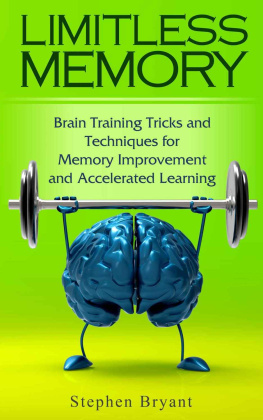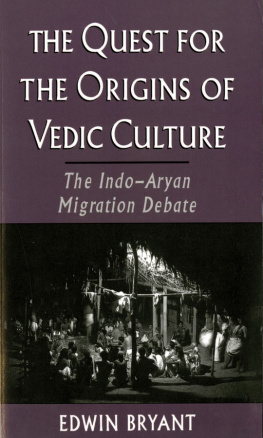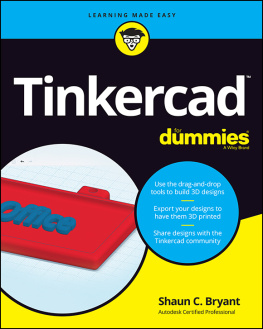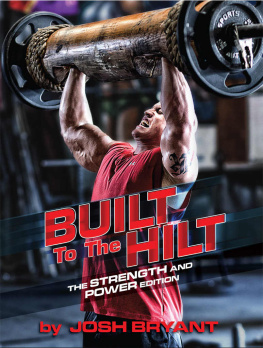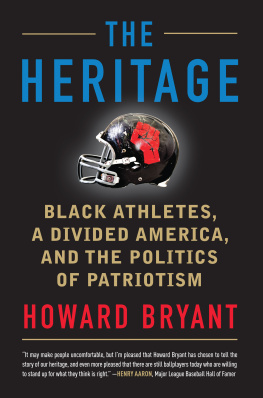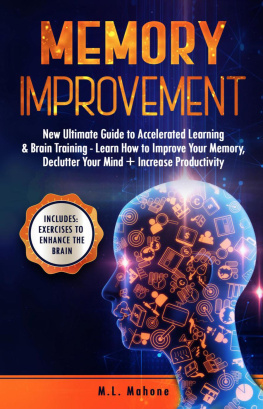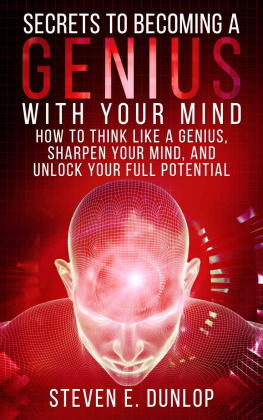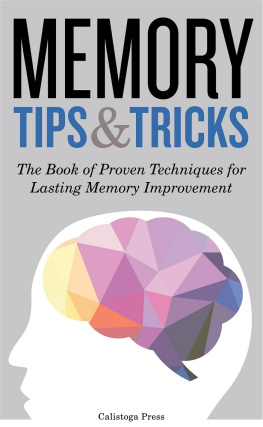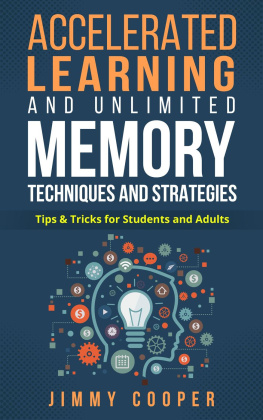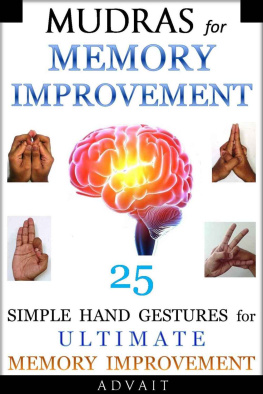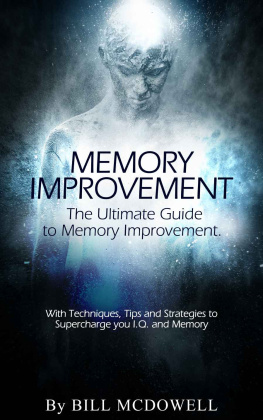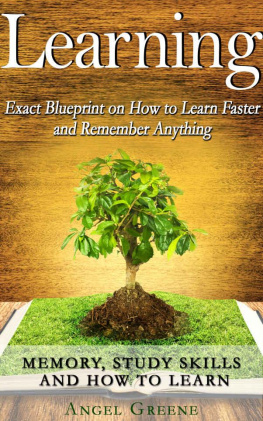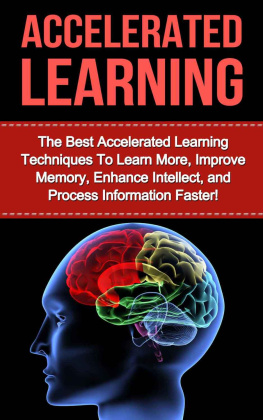Bryant - Limitless Memory: Brain Training Tricks and Techniques for Memory Improvement and Accelerated Learning
Here you can read online Bryant - Limitless Memory: Brain Training Tricks and Techniques for Memory Improvement and Accelerated Learning full text of the book (entire story) in english for free. Download pdf and epub, get meaning, cover and reviews about this ebook. year: 2014, genre: Religion. Description of the work, (preface) as well as reviews are available. Best literature library LitArk.com created for fans of good reading and offers a wide selection of genres:
Romance novel
Science fiction
Adventure
Detective
Science
History
Home and family
Prose
Art
Politics
Computer
Non-fiction
Religion
Business
Children
Humor
Choose a favorite category and find really read worthwhile books. Enjoy immersion in the world of imagination, feel the emotions of the characters or learn something new for yourself, make an fascinating discovery.
Limitless Memory: Brain Training Tricks and Techniques for Memory Improvement and Accelerated Learning: summary, description and annotation
We offer to read an annotation, description, summary or preface (depends on what the author of the book "Limitless Memory: Brain Training Tricks and Techniques for Memory Improvement and Accelerated Learning" wrote himself). If you haven't found the necessary information about the book — write in the comments, we will try to find it.
Limitless Memory: Brain Training Tricks and Techniques for Memory Improvement and Accelerated Learning — read online for free the complete book (whole text) full work
Below is the text of the book, divided by pages. System saving the place of the last page read, allows you to conveniently read the book "Limitless Memory: Brain Training Tricks and Techniques for Memory Improvement and Accelerated Learning" online for free, without having to search again every time where you left off. Put a bookmark, and you can go to the page where you finished reading at any time.
Font size:
Interval:
Bookmark:
Limitless Memory
Brain Training Tricks and Techniques for Memory Improvement and Accelerated Learning
Stephen Bryant
Table of Contents
I want to thank you and congratulate you for downloading the book, Limitless Memory .
This book contains proven steps and strategies to improve your memory and to train your brain to retain information more efficiently and more quickly. Some lucky few are born with amazing memory, able to memorize anything just from glancing through it, while others may find it hard to just even remember where we left our car keys. While extraordinary memory may be a natural talent, memory is also a skill and like any skill, one can train at it to the level of mastery. The secret to have success is like anything elsehave the right methods in place and the motivation to keep at it. This book will supply you with the right tools and information and if you can bring the motivation, limitless memory will be within your grasp.
Thanks again for downloading this book, I hope you enjoy it!
Memory is an integral function of the brain wherein certain information are encoded and stored and, under instances where it is needed, retrieved. Memory is an important function in the nervous system; without it, the brain would not be able to remember how to eat, breathe, do certain things, nor to walk or talk. Without having the information stored into our brains as memory, our bodies would be useless and we would be nothing but an empty shell.
In general, there are 3 types of human memory; the sensory memory, the short term and the long term memory. These types affect the type of activities one person has regularly. Often, failure or malfunction of a certain memory type would result in memory related ailments, often associated in elder people such as Alzheimers disease.
Sensory Memory
The sensory memory refers to that part of the system wherein the sensory receptors store and process the received information long enough for it to be transferred to the nervous system for further processing. It is considered one of the shortest term memory, as it usually takes place for only a short period of time, specifically the travel time of the information from the sensory receptors to the nervous system. The Sensory Memory, commonly abbreviated as SM, lets the person retain specific information through impressions even after the receptors have been stimulated. SM will allow the travel of the information up to the brain, allowing the sensation to be categorized and associated with the main senses of the body which as the touch, sight, smelling, tasting, and hearing. Sensory Memory however, is very short term as the information is immediately forgotten after a few seconds.
There are sub-types of sensory memory, each classified according to the sensory organ where the information was gathered. Two of the most studied are the iconic and echoic memory. Iconic memory refers to the memory of the information gathered visually. Studies about iconic memory suggests that the iconic memory of a person is very short that the brain would barely have the time to process the information received for the storage of such would only last for less than a second.
Echoic memory on the other hand, refers to the memory of the information gathered through the sense of hearing or sounds. Unlike iconic memory, the information gathered through hearing tends to last longer up to four whole seconds before being completely forgotten. An experiment to test the echoic memory in a person is by dictating a series of number to them. If the person is able to retell the series in less than 4 seconds, then there is a big possibility that all he would get it right and remember everything. If the person waited for a few more seconds however, there is a chance that the he would have forgotten parts of the series at such point.
Short Term Memory
The short term memory on the other hand refers to the brains capacity to store and hold information in miniscule amount for a short time period. Unlike the sensory memory, short term memory would last from 20 up to 30 seconds before being forgotten. Often, Short-term memory is associated with the working memory as they have almost the same set of definition and parameters. Take note that there is a difference between the two however, for while work term memory would refer to the active processes that you would temporarily store in the brain in order to properly manipulate the information you receive, short term memory on the other hand would refer to temporary storage of information itself.
With short term memory being temporary information storage, there are limits and duration to this type of memory. For one, only up to about 7 items or information may be stored at a time. There is an idea introduced by the Psychologist, George Miller in 1956, suggesting that short term memory may be expanded in an approximately seven plus or minus two items at a time.
As a person ages, one would feel symptoms of memory loss. Deficit of this ailment are often attributed in short-term memory, and is visibly observable to people between 55 and 85. Memory ailments which affect the short term memory include Alzheimers disease, Advanced Ace, Schizophrenia, Aphasia, Short-term memory and intelligence, and Posttraumatic stress disorder.
Long-Term Memory
LTM or the Long Term Memory, unlike the SM and STM, would last for such long periods of time. It is also known as the reference memory, and this refers to the information that is stored and used for daily task performance. Unlike STM where memories would last for about 30 seconds at most, Long-Term memories are very long that I could last from days to decades at most.
LTM is classified into 2 types; the explicit and implicit memories. Explicit or Declarative Memories refer to the information that your brain looks into for conscious actions and decisions. Such memories could refer to either specific events or any particular knowledge or information that you use daily. The Procedural or implicit memory on the other hand refers to the information that your brain uses for unconscious activities, including body movement and the capacity to manipulate objects. Another perfect example of procedural memory is driving or using a gadget such as a computer. In these both cases, learning them at first may have been integral, but they would gradually move on as an instinctive or natural process as you go along, knowing fully well the process of manipulating the car without much conscious effort.
In the following chapters, we will delve deeper into understanding memories. We will find out what we can do to improve our memories, and how our daily lives and activities affect are our information storage capacity over time.
Chapter 2: Attention is the Pathway to Memory
 A positive effect of having a clear and concise memory is by being able to fully concentrate on a particular task. Eliminating distractions in everyday life is truly a challenge for anybody, and for the most part, people find themselves in trouble, figuring out a way to concentrate and focus on a task. Here are some things that you may try doing in order to sustain your focus and retain your concentration.
A positive effect of having a clear and concise memory is by being able to fully concentrate on a particular task. Eliminating distractions in everyday life is truly a challenge for anybody, and for the most part, people find themselves in trouble, figuring out a way to concentrate and focus on a task. Here are some things that you may try doing in order to sustain your focus and retain your concentration.
Eliminate distractions people tend to have terrible digression and short attention span to whatever task that they are doing when there is something else that keeps their attention away from the task at hand. It could be through a text or call, a television program, a particular game---anything at all. The first and probably best step that you can do about this is to remove all the potential distractions. Shut off your cellular phones and tuck it far away if you have to, or perhaps turn off the TV. This way, you would have your undivided attention to what you are doing and not find your mind floating somewhere else.
Font size:
Interval:
Bookmark:
Similar books «Limitless Memory: Brain Training Tricks and Techniques for Memory Improvement and Accelerated Learning»
Look at similar books to Limitless Memory: Brain Training Tricks and Techniques for Memory Improvement and Accelerated Learning. We have selected literature similar in name and meaning in the hope of providing readers with more options to find new, interesting, not yet read works.
Discussion, reviews of the book Limitless Memory: Brain Training Tricks and Techniques for Memory Improvement and Accelerated Learning and just readers' own opinions. Leave your comments, write what you think about the work, its meaning or the main characters. Specify what exactly you liked and what you didn't like, and why you think so.

